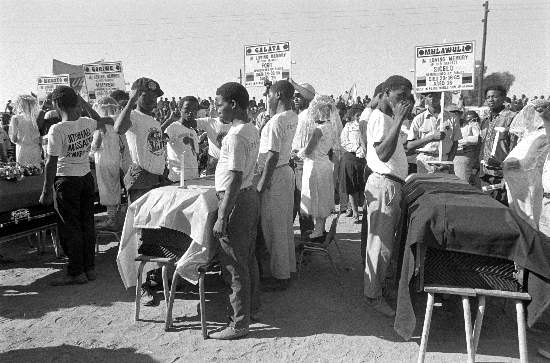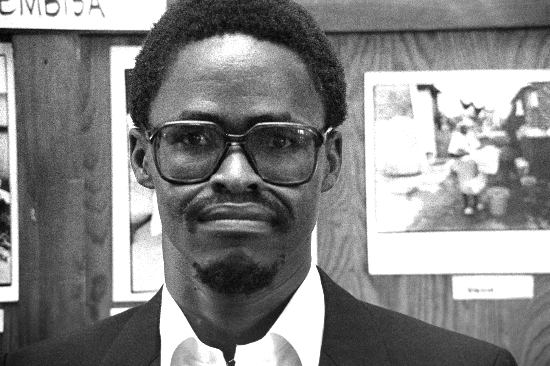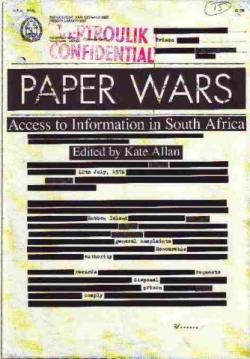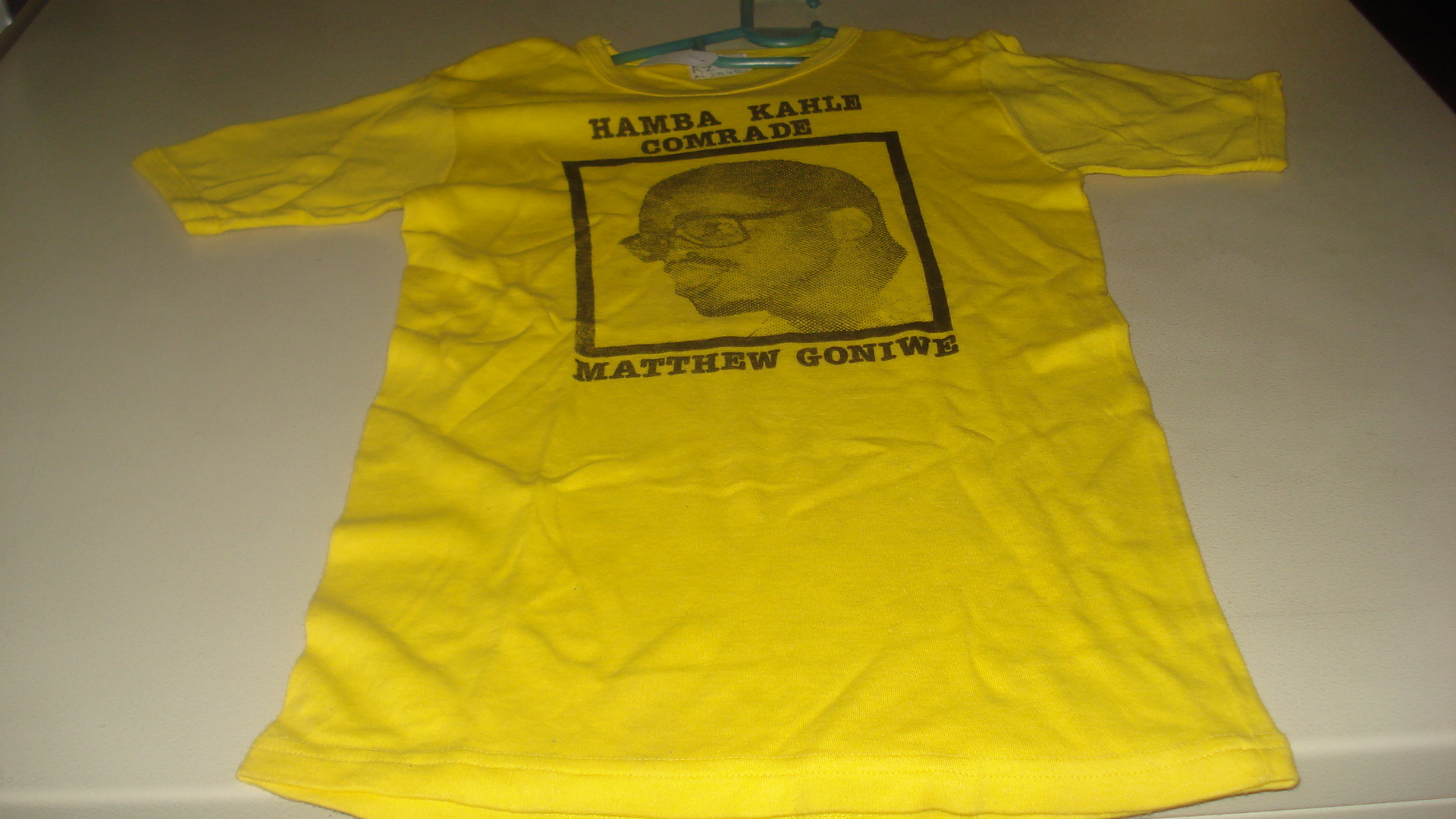
Twenty five years ago, four Eastern Cape activists were intercepted by security police in a roadblock near Port Elizabeth. They were unaware that two members of their group - Matthew Goniwe and Fort Calata - had been targeted for assassination. The Cradock Four - Goniwe, Calata, Sparrow Mkonto and Sicelo Mhlauli - were never seen alive again.
Their death marked a turning point for struggle politics. On the day of their funeral, President PW Botha responded by declaring a national State of Emergency, which would remain in place for a number of years.
The targeted assassination of Goniwe, Calata, Mkonto and Mhlauli by the Civil Cooperation Bureau, apartheid's top-secret hit squad, remained a matter of speculation for many years, particularly as the apartheid state plummeted to a new nadir with heightened repression and unrest.
The South African government denied its involvement in the murder of the Cradock Four men. However, by early June, a copy of the signal message form issuing their death warrant was anonymously sent to Transkei's Minister of Defence, Major-General Bantu Holomisa, who forwarded the chilling document to Transkei's Director of Military Intelligence. The contents of Holomisa's letter reflect the extent to which state-sanctioned murder formed part of the apartheid regime's desperate measures to control resistance:
"The most striking aspect of this signal message is para 3 which categorically states the urgency for the PERMANENT REMOVAL OF  MATTHEW GONIWE, MBULELO GONIWE AND FORT CALATA from the community... people are eager to know the mysterious circumstances surrounding their vanishing... there is no doubt that the physical elimination of Goniwe and Calata was approved at the highest echelons of the state security council... the RSA government has holly denied its complicity in perpetration of the atrocities."
MATTHEW GONIWE, MBULELO GONIWE AND FORT CALATA from the community... people are eager to know the mysterious circumstances surrounding their vanishing... there is no doubt that the physical elimination of Goniwe and Calata was approved at the highest echelons of the state security council... the RSA government has holly denied its complicity in perpetration of the atrocities."
- Letter from Bantu Holomisa, Minister of Defence, Transkei, to Director of Military Intelligence, Freedom of Information Programme (FOIP) Collection, AL2878_A2.2.15.103.35
World launch of Cradock Four film
The 25th anniversary of the death of the Cradock Four on 27 June 2010 has been commemorated with the launch of the long-anticipated film by South African documentary-maker David Forbes at Museum Afrika in Newtown, Johannesburg.
The film had been in production for seven years, and much time was spent accessing transcripts of amnesty hearings related to the case, as well as all copies of documents submitted during the trial. SAHA assisted David Forbes in defying the Department of Justice (DoJ) in their refusal to make this material accessible; on the day of a hearing set to take place in the Pretoria Supreme High Court, the DoJ relented, and an out-of-court settlement was reached, granting SAHA full access to all requested records.
Visit Forbes' website dedicated to the Cradock Four

Paper Wars
Forbes' experience of using the Promotion of Access to Information Act No 2 of 2000 (PAIA) to gain information pertaining to the Cradock 4 case, including SAHA's central role in litigation against the DOJ, is detailed in SAHA's 2009 publication, Paper Wars: Access to Information in South Africa, edited by Kate Allan. Richard Calland refers to the Cradock Four case in his chapter ‘Illuminating the Politics and Practice of Access to Information in South Africa' while former SAHA director Piers Pigou discusses the legal implications of the Cradock Four case in his chapter entitled ‘Accessing the Records of the Truth and Reconciliation Commission.'
> Learn more about Paper Wars.
SAHA Collections and the Cradock Four
AL3138 :: David Forbes Collection
Forbes has had a long-standing relationship with SAHA. He has donated a fortune of material related to his own work. This collection includes a range of student newspapers from different universities from the late 1970s to early 1980s. Forbes was involved as contributor and as part of the editorial teams for these newspapers. Forbes also donated a significant number of 1994 elections posters (mostly posterboards) to the archive.
AL2878 :: The Freedom of Information Programme (FOIP) Collection
The Freedom of Information Programme (FOIP) collection includes apartheid era security establishment records, documents created by the South African government bodies and agencies post- apartheid, and documents from several private bodies. One of the Special Projects undertaken by the South African History Archive (SAHA) to test the parameters of freedom of information in South Africa includes materials relating to the Truth and Reconciliation Commission (TRC). This includes a report regarding phone taps on Matthew Goniwe and others; the report was used as evidence in the amnesty hearings. [See AL2878_A2.2.15]

AL2540 :: The SAHA Ephemera Collection
The great majority of the items in this collection date from the 1980s, and include t-shirts, stickers, badges, banners, videos and miscellaneous items. These items were collected from political parties, labour movements and social forums who used these items during protests, celebrations, commemorations and campaigning. The Cradock Four became icons for resistance, and photographs of them featured on T-shirts, posters, and other forms of ephemera included in this collection.






 MATTHEW GONIWE, MBULELO GONIWE AND FORT CALATA from the community... people are eager to know the mysterious circumstances surrounding their vanishing... there is no doubt that the physical elimination of Goniwe and Calata was approved at the highest echelons of the state security council... the RSA government has holly denied its complicity in perpetration of the atrocities."
MATTHEW GONIWE, MBULELO GONIWE AND FORT CALATA from the community... people are eager to know the mysterious circumstances surrounding their vanishing... there is no doubt that the physical elimination of Goniwe and Calata was approved at the highest echelons of the state security council... the RSA government has holly denied its complicity in perpetration of the atrocities."
